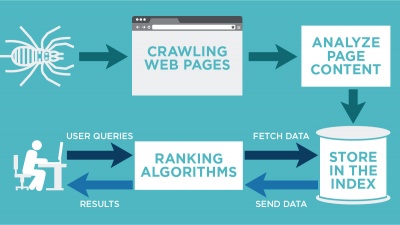Web-indexing

Search engine indexing collects, parses, and stores data to facilitate fast and accurate information retrieval. Index design incorporates interdisciplinary concepts from linguistics, cognitive psychology, mathematics, informatics, and computer science. An alternate name for the process in the context of search engines designed to find web pages on the Internet is web indexing.[2]
Search engines index websites in order to respond to search queries with relevant information as quickly as possible. For this reason, it stores information about indexed web pages, e.g. keyword, title or descriptions, in a database. This way search engines can quickly identify pages relevant to a search query.
Indexing has the additional purpose of giving a page a certain weight, as described in the search algorithms. This way search results can be ranked, after being indexed.[3]
When you look at a search results page, you are looking at the results of your search query against the web index for that search engine.
This image used with permission from Stone Temple [4]

Video[edit]
- Try this to help you understand this better: https://www.youtube.com/watch?v=SW_gfeug9hM
- This is also suitable: https://www.youtube.com/watch?v=K5qOuoj_dwA
Knowledge Graph[edit]
- Please review this blog post about knowledge graph
- This is good: https://www.youtube.com/watch?v=mmQl6VGvX-c
Standards[edit]
These standards are used from the IB Computer Science Subject Guide[5]
- Outline the purpose of web-indexing in search engines.
References[edit]
- ↑ http://www.flaticon.com/
- ↑ https://en.wikipedia.org/wiki/Search_engine_indexing
- ↑ http://ibcomputerscience.xyz/c-2-7-outline-the-purpose-of-web-indexing-in-search-engines/
- ↑ https://www.stonetemple.com/how-googles-search-results-work-crawling-indexing-and-ranking/
- ↑ IB Diploma Programme Computer science guide (first examinations 2014). Cardiff, Wales, United Kingdom: International Baccalaureate Organization. January 2012.